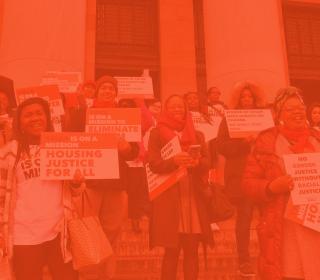The power of Storytelling
Storytelling is an often overlooked strategy for influencing social change, and can frequently work better than raw data when trying to change hearts and minds. As former Firesteel project assistant Paige McAdam wrote, "stories allow us to attempt to understand the lived experiences of those different from ourselves; more than that, they allow us to see our commonalities with one another." With this year's theme of "Find Your Voice, Share Your Story," we want to explore the types of stories that make change in our community, and what we can do to dismantle barriers that prevent women and girls from sharing their stories.
The most impactful kind of stories are the ones that illustrate the destructive effects that systems like racism and sexism have on the daily lives of women and families in our region. Oppressive policies that curtail reproductive rights or enable violence by police against people of color are not only a tragedy for those who are directly impacted, but a cost for our economic, social, and emotional health as a community.
Ashley Danielson told her story of graduating high school while experiencing homelessness as part of our StoryCorps project two years ago. Her poignant recollections of how long it took just to get to school because of housing instability remind us that homelessness doesn't just impact one aspect of a young woman's life, but her education and well-being.
Focusing on inclusion in community decision-making
Including the voices of women and girls in decision making is not as simple as voting female representatives into power, although that is certainly an element of its success. We must find ways to lower the barriers for people of color and working people to provide their feedback to decision makers.
Many of our representative bodies, such as city councils and the state legislature, hold hearings when most folks are at work, and during evenings when many women are doing the unpaid labor of childcare. This skews the makeup of those hearings and testimonies to those who have the wealth and time to attend. The end result of this is often a much older, more White, and more male sample of testimony than the population at large.
How can we support women to influence change through their stories?
Everyone's voice deserves to be heard, but for women who are marginalized from public conversation it can be difficult or unsafe to share their stories. It is not a matter of helping women find their own voices, as every woman already has that power, but rather helping them to see how their voice matters, and that what they have to say is important to the conversation.
Helping women be heard is critical to infusing public debate with a necessary perspective on the issues facing our community. We can help them in this journey by developing strategies to engage women and girls specifically in telling their stories by removing many of the barriers imposed on them by patriarchy and sexism. Those barriers are often access, resources, and approaches that are competent for women.
Zaneta Reid fled an abusive relationship with her children, experiencing homelessness and more violence when her abuser attempted to kill her. Zaneta's story is an important reminder that domestic violence and homelessness are highly correlated, and it reinforces the data that shows that.
Building spaces for women like Zaneta to be supported so they can tell their story of trauma without fear is necessary to make the changes to our justice system that will ensure that no woman has to experience what Zaneta survived. This is why Firesteel works to elevate the stories of women within our public conversations on the issues that directly affect them.

Eric Bronson is the Digital Advocacy and Engagement Manager at YWCA. He manages the Firesteel blog in addition to its social media streams and action initiatives. A graduate of Oberlin College, Eric focuses on the intersection of race and gender within the American political economy.
We tell the stories of those with lived experiences of racism and sexism and invite supporters to take concrete actions to correct the root causes of disparity in our communities.


